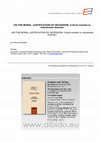Papers by Premysl Rosulek

Journal of Nationalism, Memory & Language Politics (JNMLP). , 2018
Islamophobia is a rather new term in scholarly fields but it is an old concept. A rather large am... more Islamophobia is a rather new term in scholarly fields but it is an old concept. A rather large amount of studies related to Islamophobia issued in the West has been debated among scholars. They can be categorized into the three fundamental areas of time, space and social groups (Bleich 2012, 182) to which, as I am convinced, debate on the accuracy of the term Islamophobia. As for the Cental European context, apart from Russia, post-Soviet areas and the Balkans, there was scarce evidence of scholarly interest and literature on Islamophobia there until recently. i assume that the three articles in this special section of the JNMLP peer-reviewed journal would contribute to bridging the existing lack of texts on the issue and would support better understanding of Islamophobia in the Central and Eastern Europe. First a text with comparative ambitions encompassing the Eastern European
perspective (nevertheless, despite of the used notion “Eastern”, countries
analyzed here may be surely considered as “Central” European also) in general will be introduced. Gert Pickel from Leipzig University and Cemal Öztürk from the Leuphana University of Lüneburg in their article titled "Islamophobia Without Muslims? The “Contact Hypothesis” as an Explanation for Anti-Muslim Attitudes – Eastern European Societies in a Comparative Perspective" argue that CEE societies are more prone to Islamophobia on an individual and societal level despite of the reality that these societies are (almost) without Muslims. Second, Vladimír Naxera and Petr Krčál from the University of West Bohemia in Pilsen, the Czech Republic, contributed to the debate with the text titled rather emotionally “This is a Controlled Invasion”: The Czech President Miloš Zeman’s Populist Perception of Islam and Immigration as Security Threats. They introduced an academic text analyzing the strategy of the Czech President Miloš Zeman using the term “security” in his “speeches, interviews, statements, and so on,” during his first term in office (2013–2017) with the help of a data set processed by MAXQDA11+. Third and finally, Ľubomír Zvada from Palacký University in Olomouc
in the Czech Republic contributed to the special section with the text
called Securitization of the Migration Crisis and Islamophobic Rhetoric: The 2016 Slovak Parliamentary Elections as a Case Study. Zvada focuses on the “migration crisis” in Slovakia and thus his contribution brings to an end the focus on the CEE realm.

The article analyses through qualitative textual analysis and manual coding Czech singers known f... more The article analyses through qualitative textual analysis and manual coding Czech singers known for their critical attitudes to the " migration crisis " as presented on their Facebook walls (2015–2017). This major focus on the singer's Facebook posts was reinforced by the analysis based on the two theoretical concepts – celebritisation of politics and post-truth politics. In sum, analyses across theoretical approaches found that a majority of singers – although not all of them – have been judging the problem through the lenses of a black-and-white " Clash of Civilizational " approach. Only a few singers run for political office and political agenda-setting linked to the " migration crisis " was not frequented as expected. Many of the investigated singers expressed support or political endorsement to xenophobic and anti-islamic political parties. Although the " Russian footage " could be denied, the style and characters of communication via Facebook revealed that in many aspects the singers' strategy is in consonance with current Kremlin propaganda.
Politologická revue, 2009

After the 1980 and 1995 sovereignty referendums in Quebec, relevant international institutions an... more After the 1980 and 1995 sovereignty referendums in Quebec, relevant international institutions and liberal democratic states involved in secessionist struggles of their peripheries and scholars started to pay attention to the issue of wording of ballot formulas designed for independence referendums. In this text, the rather underestimated scholarly reflection of the issue will be critically scrutinized. Scholars have investigated on many aspects of the ballot text. Nevertheless, I argue that the whole debate on its legitimacy can be narrowed to three most relevant legitimizing criteria. Naturally, referendum questions ought to be an important part of scholarly attention, nevertheless, the relevance of response options cannot be underestimated. Last but not least, attention was paid to the question whether single-question ballot texts deserve more legitimacy than multiple-choice ballot texts. I found out that there was a dynamic development of the issue within the last two decades. As for intelligibility of the referendum questions, scholars have defined a clear question in opposition to unbearably long and biased formulas. As for fair response options, it has not been clear whether, in future, the most common Yes-No binary alternatives might
be substituted by long and illustrative response options as it was the case on the ballot text designed for “Brexit”. Finally, scholars have not brought a clear answer to the question whether a single issue – which oversimplifies the issue – or a multiple-choice ballot text – which rarely generates clear majority for any of the alternatives – fulfils better the criteria of legitimacy.

ALPPI, Vol. X, No. 1.
This article explores the evaluation of norms and principles of an intelligible referendum questi... more This article explores the evaluation of norms and principles of an intelligible referendum question (RQ) from Québec's biased formula in 1980 until the clearly constructed wording of the question for independence referendum held in Scotland in 2014. In this text, for the purpose of evaluation of whether a formula was biased or intelligible, the criteria introduced recently by the Electoral Commission in the UK were employed. Specifically, it means that the RQ shall be clear and simple, to the point, unambiguous, neutral and avoid misleading voters. Apart from biased RQs in 1980 and 1995 in Québec referendums, the following six referendums on independence were carefully selected for the investigation. Secessions and attempted secessions in the European context are represented by the cases of Montenegro, Catalonia, and Scotland, while the post-colonial secessionist units from larger states apply for Eritrea, East Timor and South Sudan. The findings were surprising in several aspects. First, liberal-democracies in the West totally failed to formulate intelligible RQs when they were constructed unilaterally by secessionists. On the contrary, if the RQ was formulated under international supervision, the formula submitted to voters was far more intelligible, also in most post-colonial cases. There is no evidence of a strong impact of principles linked to a clear and intelligible RQ evaluated in Canada and in the UK on the formulation of a concrete RQ on independence.

The Issue of Madhism within Shia Ideology and Ahmadinejad’s Doctrine, Mar 10, 2015
ABSTRACT: I will attempt to argue in this paper that the rise of Mahdism within Shi’a political I... more ABSTRACT: I will attempt to argue in this paper that the rise of Mahdism within Shi’a political Islam during Ahmadinejad’s era did not lead to a significant break with previous development. Relevance of Mahdism within Shi’a politicized and ideologized Islam in Iran has been on the rise since the second half of 20th century. The issue occurred in Shi’a political philosophy and theory prior to the Islamic revolution in Iran. In the post-revolutionary period, Mahdism became an inherent part of the Islamic political system. I also argue that rising emphasis on Mahdism during Ahmadinejad’s political career could be explained by the complexity of political, cultural, economical and also religious factors. The article is firstly aimed at conceptualization of the Shi’a political Islam in Iran and on Mahdism in general. Secondly, the paper focuses on the rise of Mahdism within the Shi’a political Islam in the second half of the 20th century. In this regard, the role of political philosopher Ali Shariati and theoretician Ayatollah Khomeini are also investigated. After that, revolutionary and post-revolutionary Iran regarding the issue of Mahdism is also evaluated in the text. At the end, the article analyzes, explains and summarizes the causes and “timing” of the rise of political Mahdism into political doctrine during Ahmadinejad’s recent presidentship in Iran.

""Major question of the presentation: Secession of Catalonia and Scotland – justifiable cases?
... more ""Major question of the presentation: Secession of Catalonia and Scotland – justifiable cases?
Structure of the presentation:
(1) The theoretical debate on the ethics of secession.
(2) Criteria relevant to the ethic of secession in case studies.
(3) Comparision of the cases of Catalonia and Scotland.
Conclusion:
(1) In general, independence is possible and per se is not against any international law eventhough neither Scotland nor Catalonia are candidates for sui generis or lex specialis in international law.
(2) Independent Scotland: YES, if there is „clear majority“ in referendum and mutual agreement on major issues with the U.K. gov. and option for „Upper Isles“ to stay in the U.K.
(3) Unilaterally secession more legitimate than in the U.K. as the Union raises political and judicial obstacles to independence, but referendum on the clear question needs to be formed.
(4) Both secession of Catalonia and Scotland would distort the principle of solidarity (and deliberative democracy) in federative, regional and unitary liberal-democratic states.
"
Hlavním cílem příspěvku je představit normativní teorie secesionismu jako relativně nové pole výz... more Hlavním cílem příspěvku je představit normativní teorie secesionismu jako relativně nové pole výzkumu v kontextu politické (morální) filozofie. Dále ve stručnosti prezentuji tři hlavní normativní směry v diskuzi o legitimitě secesionismu
(1) plebscitární (H. Beran),
(2) princip národního sebeurčení (D. Miller)
(3) spravedlivá příčina (A. Buchanan)
a následně zhodnotím klady i zápory těchto tří teoretických směrů. V samotném závěru se pokusím o jistou syntézu vycházející z kladů všech výše uvedených tří směrů a vyzývám k tomu, aby stávající teorie, vhodné pro demokraticko-liberální milieu, byly dále rozpracovány tak, aby mohly být aplikovatelné i na ostatní politické systémy, v nichž je koneckonců potenciál k secesionismu ještě výrazněji zastoupen než za Západě.

Ten years after the Ohrid Framework Agreement (OFA) was signed, almost
all of its parts were impl... more Ten years after the Ohrid Framework Agreement (OFA) was signed, almost
all of its parts were implemented as numerous constitutional amendments
and laws which have been approved by the parliament. Could the OFA implementations at ‘formal level’ be evaluated as a success? How has the post-conflict management influenced the society at an ‘informal level’? I assume that the relations between Macedonians and Albanians remain complicated and unresolved in many respects regardless of some positive outcomes since the OFA policy started to be implemented. I argue that the implementation of the OFA, instead of reaching denationalization of the society, has provoked nationalism and despite the struggle for equal communities, ethnicity and unliberal tendencies are still principally present
in the OFA. Furthermore, the majority of Macedonians perceived the OFA as
a threat to their nation-building process conducted in the 90’s, whereas the Albanian minority does not assume the OFA as a definitive solution for reconciliation but only as a first step on the way towards better conditions. The two theses formulated in the introductory section are testing whether the Macedonian majority still wishes to guard its superior position from the 90’s and whether the Albanians are likely to formulate demands reaching far beyond the OFA treaty. I came to the conclusion that one decade after the OFA, the ethnic issues remain unresolved and some other originally non-ethnic issues could be easily turned into nationalistic ones. Despite the relative cooperation at governmental and institutional levels, there are highly disparate, competing and mutually distrustful public discourses.

The article firstly identifies cleavages in Eastern and Central European
(ECE) countries and Hung... more The article firstly identifies cleavages in Eastern and Central European
(ECE) countries and Hungary in particular, recognising that nationalist,
cultural and economy-protected interests have played a significant role in postcommunist Hungary. The text focuses on the consolidation of the centre-right camp of political parties in Hungary between 1987 and 2002 in relation to nationalism and populism. Further to this it analyses the declining tendencies, fall and final break-up of the moderate-conservative MDF and other right-wing parties such as the agrarian-conservative FKGP and the Christian-conservative KDNP as they were overshadowed by the FIDESZ’s rise after its shift to the right in 1993. The strategic, nationalistic and populist tendencies within the ideology of the FIDESZ will be analysed in the text. The major goal of the article has been to uncover the development of interrelated strategies and ideologies of the FIDESZ with nationalist-populist appeal up until 2002. Nevertheless, admitting only the partial and limited symmetrical logic of the development of the centre-right in Hungary, new trends of development after 2006 have also been mentioned at the end of the text.

The following article explores an until-recently forgotten topic in political philosophy: the mor... more The following article explores an until-recently forgotten topic in political philosophy: the morality of secession. The normative theories of just secession will be explored in the text. The political conception of Allen Buchanan is explored in the case of just-cause theories, David Miller's approach for the case of national self-determination theories, and, finally, Harry Beran's suggestions for plebiscitary theories. Then, I analyze the advantages and disadvantages of all mainstream theories of secession. My conclusion is that for the contemporary liberal democratic states, the most justified approach is the one which combines the good sides of plebiscitary and national self-determination theories. I favor primary right secession because most of the contemporary state borders were drawn during undemocratic conditions and should be open to changes under democratic conditions if the majority desires them. However, I discovered that the theories of secession avoided paying attention to the third world countries where secessionist potential is far higher.

The end of the Second World War was marked by the forced expulsion of the Sudeten Germans from Ce... more The end of the Second World War was marked by the forced expulsion of the Sudeten Germans from Central and Eastern European countries. The year 1989 and the fall of the Iron Curtain represented a new era of Czechoslovak-German and, after the break-up of Czechoslovakia, of Czech-German relations. This article presents findings based on a both qualitative and quantitative content analysis of the daily press focusing on the four most important events directly or indirectly related to the Sudeten Germans: a) Reconciliation '95 initiative and the consequent Way to Reconciliation in 1996, b) Czech-German declaration signed in Prague in 1997, c) The approval of the unchangeability of Beneš decrees by the Chamber of Deputies of the Czech Parliament in 2002, d) the decision made by the Czech President Vaclav Klaus not to sign Lisbon treaty because it could undermine the post-war Benes decrees in 2009. Data presentation is followed by analysis and possible verification of the main assumptions of the text, focusing on the possible shift in values and reflections (if any) in society with regards to the Sudeten German question.
Slovak Foreign Policy Affairs, Jan 1, 2002

World Press Review, Jan 1, 2003
Macedonia is characterized by an unemployment rate that reaches 40 percent, according to official... more Macedonia is characterized by an unemployment rate that reaches 40 percent, according to official statistics, as well as poverty, distrust between Albanians and Macedonians, creeping segregation of both communities, and uncertainty regarding the country’s future. Nevertheless, good news appears from time to time—for instance, from soccer stadiums. Tens of thousands of fans took to the streets of Skopje last fall to celebrate after Macedonia’s stunning 2-2 draw against England in the qualifying game for the European Soccer Championship. President Boris Trajkovski called the result the greatest sports event in the history of the country and sent a letter of congratulations to the soccer players.
And who became the public’s favorite? It was Artim Sakiri, an Albanian soccer player, who scored straight from a corner kick in the game. Maciej Kaczorowski from Poland, who has been living in Macedonia for several years and works in Skopje for the Euro-Balkan Institute, a nongovernmental organization, believes that Sakiri has achieved more for mutual coexistence of Albanians and Macedonians with this goal than all the projects and nongovernmental organizations combined.











Uploads
Papers by Premysl Rosulek
perspective (nevertheless, despite of the used notion “Eastern”, countries
analyzed here may be surely considered as “Central” European also) in general will be introduced. Gert Pickel from Leipzig University and Cemal Öztürk from the Leuphana University of Lüneburg in their article titled "Islamophobia Without Muslims? The “Contact Hypothesis” as an Explanation for Anti-Muslim Attitudes – Eastern European Societies in a Comparative Perspective" argue that CEE societies are more prone to Islamophobia on an individual and societal level despite of the reality that these societies are (almost) without Muslims. Second, Vladimír Naxera and Petr Krčál from the University of West Bohemia in Pilsen, the Czech Republic, contributed to the debate with the text titled rather emotionally “This is a Controlled Invasion”: The Czech President Miloš Zeman’s Populist Perception of Islam and Immigration as Security Threats. They introduced an academic text analyzing the strategy of the Czech President Miloš Zeman using the term “security” in his “speeches, interviews, statements, and so on,” during his first term in office (2013–2017) with the help of a data set processed by MAXQDA11+. Third and finally, Ľubomír Zvada from Palacký University in Olomouc
in the Czech Republic contributed to the special section with the text
called Securitization of the Migration Crisis and Islamophobic Rhetoric: The 2016 Slovak Parliamentary Elections as a Case Study. Zvada focuses on the “migration crisis” in Slovakia and thus his contribution brings to an end the focus on the CEE realm.
be substituted by long and illustrative response options as it was the case on the ballot text designed for “Brexit”. Finally, scholars have not brought a clear answer to the question whether a single issue – which oversimplifies the issue – or a multiple-choice ballot text – which rarely generates clear majority for any of the alternatives – fulfils better the criteria of legitimacy.
Structure of the presentation:
(1) The theoretical debate on the ethics of secession.
(2) Criteria relevant to the ethic of secession in case studies.
(3) Comparision of the cases of Catalonia and Scotland.
Conclusion:
(1) In general, independence is possible and per se is not against any international law eventhough neither Scotland nor Catalonia are candidates for sui generis or lex specialis in international law.
(2) Independent Scotland: YES, if there is „clear majority“ in referendum and mutual agreement on major issues with the U.K. gov. and option for „Upper Isles“ to stay in the U.K.
(3) Unilaterally secession more legitimate than in the U.K. as the Union raises political and judicial obstacles to independence, but referendum on the clear question needs to be formed.
(4) Both secession of Catalonia and Scotland would distort the principle of solidarity (and deliberative democracy) in federative, regional and unitary liberal-democratic states.
"
(1) plebscitární (H. Beran),
(2) princip národního sebeurčení (D. Miller)
(3) spravedlivá příčina (A. Buchanan)
a následně zhodnotím klady i zápory těchto tří teoretických směrů. V samotném závěru se pokusím o jistou syntézu vycházející z kladů všech výše uvedených tří směrů a vyzývám k tomu, aby stávající teorie, vhodné pro demokraticko-liberální milieu, byly dále rozpracovány tak, aby mohly být aplikovatelné i na ostatní politické systémy, v nichž je koneckonců potenciál k secesionismu ještě výrazněji zastoupen než za Západě.
all of its parts were implemented as numerous constitutional amendments
and laws which have been approved by the parliament. Could the OFA implementations at ‘formal level’ be evaluated as a success? How has the post-conflict management influenced the society at an ‘informal level’? I assume that the relations between Macedonians and Albanians remain complicated and unresolved in many respects regardless of some positive outcomes since the OFA policy started to be implemented. I argue that the implementation of the OFA, instead of reaching denationalization of the society, has provoked nationalism and despite the struggle for equal communities, ethnicity and unliberal tendencies are still principally present
in the OFA. Furthermore, the majority of Macedonians perceived the OFA as
a threat to their nation-building process conducted in the 90’s, whereas the Albanian minority does not assume the OFA as a definitive solution for reconciliation but only as a first step on the way towards better conditions. The two theses formulated in the introductory section are testing whether the Macedonian majority still wishes to guard its superior position from the 90’s and whether the Albanians are likely to formulate demands reaching far beyond the OFA treaty. I came to the conclusion that one decade after the OFA, the ethnic issues remain unresolved and some other originally non-ethnic issues could be easily turned into nationalistic ones. Despite the relative cooperation at governmental and institutional levels, there are highly disparate, competing and mutually distrustful public discourses.
(ECE) countries and Hungary in particular, recognising that nationalist,
cultural and economy-protected interests have played a significant role in postcommunist Hungary. The text focuses on the consolidation of the centre-right camp of political parties in Hungary between 1987 and 2002 in relation to nationalism and populism. Further to this it analyses the declining tendencies, fall and final break-up of the moderate-conservative MDF and other right-wing parties such as the agrarian-conservative FKGP and the Christian-conservative KDNP as they were overshadowed by the FIDESZ’s rise after its shift to the right in 1993. The strategic, nationalistic and populist tendencies within the ideology of the FIDESZ will be analysed in the text. The major goal of the article has been to uncover the development of interrelated strategies and ideologies of the FIDESZ with nationalist-populist appeal up until 2002. Nevertheless, admitting only the partial and limited symmetrical logic of the development of the centre-right in Hungary, new trends of development after 2006 have also been mentioned at the end of the text.
And who became the public’s favorite? It was Artim Sakiri, an Albanian soccer player, who scored straight from a corner kick in the game. Maciej Kaczorowski from Poland, who has been living in Macedonia for several years and works in Skopje for the Euro-Balkan Institute, a nongovernmental organization, believes that Sakiri has achieved more for mutual coexistence of Albanians and Macedonians with this goal than all the projects and nongovernmental organizations combined.
perspective (nevertheless, despite of the used notion “Eastern”, countries
analyzed here may be surely considered as “Central” European also) in general will be introduced. Gert Pickel from Leipzig University and Cemal Öztürk from the Leuphana University of Lüneburg in their article titled "Islamophobia Without Muslims? The “Contact Hypothesis” as an Explanation for Anti-Muslim Attitudes – Eastern European Societies in a Comparative Perspective" argue that CEE societies are more prone to Islamophobia on an individual and societal level despite of the reality that these societies are (almost) without Muslims. Second, Vladimír Naxera and Petr Krčál from the University of West Bohemia in Pilsen, the Czech Republic, contributed to the debate with the text titled rather emotionally “This is a Controlled Invasion”: The Czech President Miloš Zeman’s Populist Perception of Islam and Immigration as Security Threats. They introduced an academic text analyzing the strategy of the Czech President Miloš Zeman using the term “security” in his “speeches, interviews, statements, and so on,” during his first term in office (2013–2017) with the help of a data set processed by MAXQDA11+. Third and finally, Ľubomír Zvada from Palacký University in Olomouc
in the Czech Republic contributed to the special section with the text
called Securitization of the Migration Crisis and Islamophobic Rhetoric: The 2016 Slovak Parliamentary Elections as a Case Study. Zvada focuses on the “migration crisis” in Slovakia and thus his contribution brings to an end the focus on the CEE realm.
be substituted by long and illustrative response options as it was the case on the ballot text designed for “Brexit”. Finally, scholars have not brought a clear answer to the question whether a single issue – which oversimplifies the issue – or a multiple-choice ballot text – which rarely generates clear majority for any of the alternatives – fulfils better the criteria of legitimacy.
Structure of the presentation:
(1) The theoretical debate on the ethics of secession.
(2) Criteria relevant to the ethic of secession in case studies.
(3) Comparision of the cases of Catalonia and Scotland.
Conclusion:
(1) In general, independence is possible and per se is not against any international law eventhough neither Scotland nor Catalonia are candidates for sui generis or lex specialis in international law.
(2) Independent Scotland: YES, if there is „clear majority“ in referendum and mutual agreement on major issues with the U.K. gov. and option for „Upper Isles“ to stay in the U.K.
(3) Unilaterally secession more legitimate than in the U.K. as the Union raises political and judicial obstacles to independence, but referendum on the clear question needs to be formed.
(4) Both secession of Catalonia and Scotland would distort the principle of solidarity (and deliberative democracy) in federative, regional and unitary liberal-democratic states.
"
(1) plebscitární (H. Beran),
(2) princip národního sebeurčení (D. Miller)
(3) spravedlivá příčina (A. Buchanan)
a následně zhodnotím klady i zápory těchto tří teoretických směrů. V samotném závěru se pokusím o jistou syntézu vycházející z kladů všech výše uvedených tří směrů a vyzývám k tomu, aby stávající teorie, vhodné pro demokraticko-liberální milieu, byly dále rozpracovány tak, aby mohly být aplikovatelné i na ostatní politické systémy, v nichž je koneckonců potenciál k secesionismu ještě výrazněji zastoupen než za Západě.
all of its parts were implemented as numerous constitutional amendments
and laws which have been approved by the parliament. Could the OFA implementations at ‘formal level’ be evaluated as a success? How has the post-conflict management influenced the society at an ‘informal level’? I assume that the relations between Macedonians and Albanians remain complicated and unresolved in many respects regardless of some positive outcomes since the OFA policy started to be implemented. I argue that the implementation of the OFA, instead of reaching denationalization of the society, has provoked nationalism and despite the struggle for equal communities, ethnicity and unliberal tendencies are still principally present
in the OFA. Furthermore, the majority of Macedonians perceived the OFA as
a threat to their nation-building process conducted in the 90’s, whereas the Albanian minority does not assume the OFA as a definitive solution for reconciliation but only as a first step on the way towards better conditions. The two theses formulated in the introductory section are testing whether the Macedonian majority still wishes to guard its superior position from the 90’s and whether the Albanians are likely to formulate demands reaching far beyond the OFA treaty. I came to the conclusion that one decade after the OFA, the ethnic issues remain unresolved and some other originally non-ethnic issues could be easily turned into nationalistic ones. Despite the relative cooperation at governmental and institutional levels, there are highly disparate, competing and mutually distrustful public discourses.
(ECE) countries and Hungary in particular, recognising that nationalist,
cultural and economy-protected interests have played a significant role in postcommunist Hungary. The text focuses on the consolidation of the centre-right camp of political parties in Hungary between 1987 and 2002 in relation to nationalism and populism. Further to this it analyses the declining tendencies, fall and final break-up of the moderate-conservative MDF and other right-wing parties such as the agrarian-conservative FKGP and the Christian-conservative KDNP as they were overshadowed by the FIDESZ’s rise after its shift to the right in 1993. The strategic, nationalistic and populist tendencies within the ideology of the FIDESZ will be analysed in the text. The major goal of the article has been to uncover the development of interrelated strategies and ideologies of the FIDESZ with nationalist-populist appeal up until 2002. Nevertheless, admitting only the partial and limited symmetrical logic of the development of the centre-right in Hungary, new trends of development after 2006 have also been mentioned at the end of the text.
And who became the public’s favorite? It was Artim Sakiri, an Albanian soccer player, who scored straight from a corner kick in the game. Maciej Kaczorowski from Poland, who has been living in Macedonia for several years and works in Skopje for the Euro-Balkan Institute, a nongovernmental organization, believes that Sakiri has achieved more for mutual coexistence of Albanians and Macedonians with this goal than all the projects and nongovernmental organizations combined.
songs critical of the “migration crisis”, and also on the
related activities of these singers on Facebook. The
main goal of the article is to introduce the texts of the
songs that went viral on YouTube (i.e. reached between
8,000 and 500,000 thousand viewers), and to
analyze how these singers imagine the contemporary
“migration crisis” and the related terms “Islam” and
“Muslim immigration”. The article is framed by two theoretical
concepts – the celebritization of politics, and
post-truth politics. One song was excluded from the
group of songs critical of Islam since it was directed
rather at the smallness of the Czech nation. The remaining
four texts of the songs analyzed here each has
a critical attitude towards different aspects of the “migration
crisis”, although these texts vary significantly.
For example, one emphasizes the image of huge
crowds of people entering the country; others stress
either the threat of the future Islamicization of society
or the need for people to mobilize at the European
level; or, finally, one portrays an Arab from Syria as a
dangerous woman chaser.